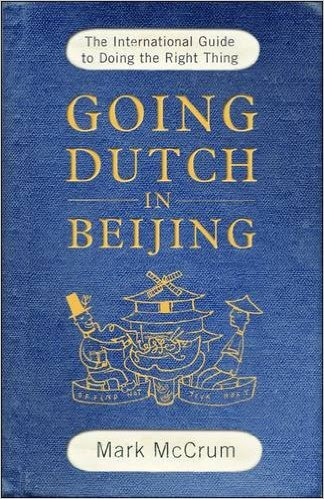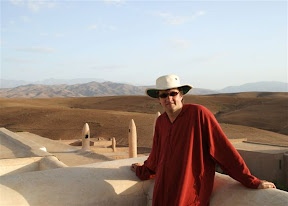I recently discovered a gem of a book about different customs around the world, entitled Going Dutch In Beijing. This book is full of information to smooth your path while abroad, while at the same time being interculturally sensitive. Eager to share this book with others, I sat down to chat with the author, Mark McCrum. Here's what he had to say...

WE: Tell us a little bit about Going Dutch in Beijing.
MM: It's a guide to the huge variety of manners and customs around the world. Here you will find why you should never make the thumbs-up sign in the Middle East, or offer to 'go Dutch' when out for a meal in China. The book is organised by themes, from first greetings to last rites, so there are lots of fun comparisons in different kinds of behaviour. For example, while it's never done to be even a minute late for dinner in Germany, in Argentina it's expected. Indeed, to turn up on time, might imply that you're greedy. I've taken a reasonably lighthearted tone throughout the book, but it does also cover more serious issues, such as attitudes to women in the Middle East and gay rights (or the lack of them) around the world.
WE: What led you to write this book?
MM: I've travelled widely around the world during twenty years as a professional travel writer, writing books and articles for UK newspapers and magazines. I realised that though there are plenty of hefty guides to intercultural differences for business people, there was no simple little guide like this, organised by behaviour rather than country. I'm fascinated by etiquette in any case, which may seem trivial but is often hugely important, even (in fact particularly) to those who wouldn't on the face of it seem to care about manners at all. Think about road rage, for example. Or queues, the barging of which can lead to people screaming at each other, if not to blows. But though essential here in the UK and in many other places, queuing is not universal, by any means.
WE: What are your favorite places to travel?
MM: Places I haven't yet been. But having said that, there are plenty of wonderful spots I'd love to revisit. Vibrant and beautiful seaside cities like Cape Town or Sydney, or magnificent bit of nature like Botswana's Okavango swamps or the Torres del Paine National Park at the very tip of Chile, where I picknicked on a glacier.
WE: What was your worst miscommunication gaffe?
MM: I'm not sure I have any that I would regard as the worst. Most dangerous was walking on Copacabana Beach in Rio de Janiero the rain, which I discovered only after I got mugged was something locals would never do. In Santiago, Chile, I managed to upset an important luncheon host by inadvertently ordering wine for the whole table (when I thought I was just getting a drink for myself), which led to a ridiculous scene where my three bottles were declared 'corked' and it was all sent back and replaced - to my very public chagrin. In the townships of Cape Town, South Africa, I didn't at first understand the three-part 'African' handshake, to the great amusement of my hosts. No serious loss of face there, but I wish I'd known in advance how to do it. In Ireland one Christmas I thought the old men at the bar were a bit odd to be looking forward to the arrival of the 'rent boys'. Luckily before I made the gaffe of articulating my disapproval, the 'wren boys' (boys dressed as wrens, following an old tradition) turned up.
WE: I see in your book, that you invite people to write to you with corrections, additions, or insights. Have you gotten lots of feedback?
MM: Well, I have included a couple of bits of feedback in both the US edition and the UK paperback. It's great that in this interactive world in which we live, I can be communicating with a doctor in Northern Italy who is telling me about the niceties of New Year pastry-eating in Italy, and a young woman in China who is filling me in on the details of dinner etiquette. I always welcome any feedback on my own website www.markmccrum.com
WE: Are there any global communication patterns? Or is everything different, globally?
MM: One of the great things about organising the book by themes rather than countries, is that I can point up the many similarities in behaviour around the world. For example, in almost all societies it's polite to wait for the host to be seated (and to perhaps say something) before you start to eat. Then again, the traditions around weddings (to which I've devoted a chapter) are remarkably similar, in that they almost all symbolise two lives becoming one. In Columbia, for example, bride and groom each take a candle and with them light a new, single one. At a Jewish wedding bride and groom drink from the same cup. And in Japan, bride and groom drink from the same cup no fewer than nine times.
WE: What do you suggest people do, to be interculturally sensitive while they travel?
MM: I think that as long as you keep your eyes open and apologise if you get something wrong, you'll be fine. Nobody expects visitors to get everything exactly right. The main thing is not to take your own cultural expectations along with you. For example, if you're on business and you're kept waiting outside your counterpart's office for hours, don't take it personally and get annoyed. Realise that in the culture you're visiting this is normal and doesn't reflect badly either on your host or yourself. It's just the way things are done. The same would apply to everything from the lack of queues in some places to male attitudes to women in others.
WE: Is there anything else you'd like to share with us?
MM: Well, obviously everything in the book (which your readers can get from Amazon.com, and makes an ideal present for anybody planning to jump on a plane and travel to far-flung shores!) More seriously, though, I hope that reading this book will help to demystify some of the terrible myths put around by politicians and others about how different people are in foreign places. For example, in the epicentre of that famous 'axis of evil', Iran, people generally take huge stock in treating each other with exaggerated politeness. They even have a word for it - taarof, which you should certainly know about before visiting that country. But to read some newspapers and follow some media reports, you'd never get an inkling of this kind of day-to-day behaviour of ordinary people. I hope this book might offer a tiny correction in such perceptions.
WE: Thanks so much, Mark!! I appreciate your time on this - and commend you on such an incredible book! I have already purchased several copies to give away - I don't want to lend mine out!
For more information on Mark, please see www.markmccrum.com.
We've also featured Mark as the July Artisan of the Month here on wanderingeducators.com.
To read his interview, and view his gorgeous paintings, please see here.

